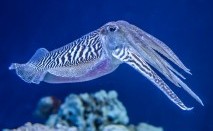
Category: Invertebrates
Hydras make up a genus of tiny (up to 10 mm long), tentacle, aquatic, predatory animals that are commonly found in unpolluted ponds, lakes, and streams in temperate and tropical regions. They are of special interest to science because they do not seem to age or die of old age. While generally stationary, or sessile, they are able to move themselves when necessary by bending over and grabbing onto the substrate with their mouth and tentacles while releasing with their “foot” – using this motion, they are able “loop” or “somersault” several inches in a day!

Cephalopods: Masterminds of the Ocean.
Octopi, cuttlefish, and squids - all cephalopods - have been observed engaging in amazing feats of intelligence (perhaps unsurprising, as cuttlefish and octopuses have the highest brain-to-body mass of all invertebrates). Their suction-cup covered arms are dexterous, and octopuses have been observed putting them to use throwing rocks, opening screw-top jars, even picking up and gathering coconut shells to build fortresses for themselves. Squids, for their part, have been observed hunting cooperatively and are able to communicate with one another via color changes, patterns, and flashing to one another - sometimes using different sides of their bodies to broadcast different signals to multiple squids! Just how smart are they? As they are typically elusive and so very different from humans, we aren’t sure yet - but we do know the question is not “Are they intelligent?” but “How intelligent are they?”
Learn more >>
 Discover Animals is a web-based educational resource offered by the NAIA
Discover Animals is a web-based educational resource offered by the NAIA